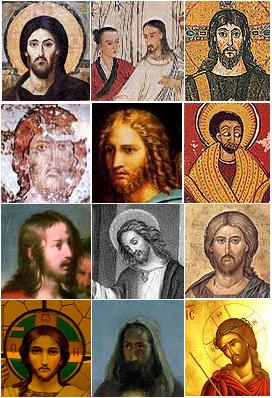
Composite of Jesus portraits (source: wikipedia)
The Quest for the Historical Jesus that has captivated the world for the past two centuries and, perhaps, was at its pinnacle after the publication in 1906 of Albert Schweitzer's Quest of the Historical Jesus and is still going strong as evidenced by famous publications such as N.T. Wright's Jesus and the Victory of God. However productive the Quest has been, it is also true that it was the Exalted Jesus, and not the so-called Historical Jesus that is the savior of the world. It is the Lord Jesus proclaimed by the Church, and not as Schweitzer concluded his book by describing the Historical Jesus as, "He comes to us as One unknown, without a name, as of old, by the lake-side, He came to those men who knew Him not."
In Karl Barth's The Resurrection of the Dead, I found this excellent quotation that provides an excellent critique of the Quest that calls the entire enterprise into question:
"I have received it from the Lord. The Lord Himself repeated to him, Paul, what He said as the Founder of the Supper": "in the night, when the Lord Jesus was betrayed. . . ." By this categorical assertion, Paul does not mean to guarantee, which would interest us, that these were the authentic words of the so-called historical Jesus. For what we call the historical Jesus, a Jesus pure and simple, who is not the Lord Jesus, but an earthly phenomenon among others to be objectively discovered, detached from His Lordship in the Church of God, apart from the revelation given in the Jesus of the Church and at first to the apostles—this abstraction was for Paul (and not for him alone) an impossible idea. The thought that Jesus should and could be first regarded by himself, in order then to recognize Him as Lord, could at most be for him a painful recollection of his former error. This Jesus, who is not the Lord, who is known after the flesh (2 Cor 5:16), was in fact the foe whom he persecuted; he no longer knows Him. But Paul is not now reflecting on what this Jesus, who was known after the flesh, might have said on the occasion of the Supper, but upon what Kyrios Jesus, the Lord of the Church, said to him, Paul, when He made him His ambassador. The Lord does not live for him in the oldest, best-attested or most credible tradition--why should it be just the Lord who lives and speaks there?
Barth, Karl. The Resurrection of the Dead. Ed. R. Dale Dawson. Eugene: Wipf & Stock, 2003. 65. Print.



Leave a comment